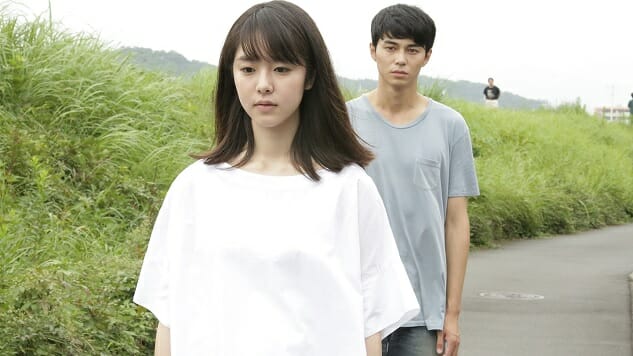Asako I & II

A tale as old as time: Girl meets boy; girl and boy fall head over heels; boy has an exhausting habit of meandering off for days at a time without explanation, and on one such walkabout never comes back home; girl grieves and moves on; girl meets a second boy who bears an eerie resemblance to the first, falls in love all over again, and then the first boy comes back into the picture and mucks everything up.
This is the stuff of Asako I & II, the latest film from Ry?suke Hamaguchi, based on the novel Netemo Sametemo by Tomoka Shibasaki. By the greatest and most unexpected of coincidences, it’s also the latest 2019 release fixated on a doppelgänger, following Jordan Peele’s Us and Lee Cronin’s The Hole in the Ground. Rather than horror, Hamaguchi approaches the subject through romantic drama peppered with a dash of wry humor: The meet-cute and timid first kiss shared between his demure title character, Asako (Erika Karata), and her original lookalike paramour, Baku (Masahiro Higashide), for instance, is accompanied by a fireworks display, but on a small, meager scale, staged by loitering teens punctuating the beat with the pathetic bang-snap of their artillery discharge.
Little details like this fill out the film’s haunting calm, Hamaguchi’s way of undercutting the threat of encroaching melancholia. Asako I & II is unavoidably sad; within its opening 20 minutes, Hamaguchi plots out an entire love affair all the way to its time of death, the moment where Baku simply vanishes from Asako’s life, seemingly forever. Baku’s a beautiful, good-natured clod with negative common sense and an aggravating knack for turning bad situations into better situations through dumb luck and dumber timing. There’s no magic in Asako I & II, but there’s magic to the arc of his life, and that, perhaps, makes his disappearance cut deeper and Asako’s grief hit harder while sparing overwrought lugubriousness.
Asako I & II is an easygoing movie, at least if the film’s exterior is taken at its words. Under the hood, it’s roiling. Hamaguchi gives attention to what the characters say as much as what they don’t, contrasting spoken dialogue with his cast members’ expressions and body language, a divide best exemplified by Asako’s introduction to Ryohei (also Higashide), Baku’s equally as handsome but considerably more sensible doppelgänger; Ryohei works for a sake company, he wears his hair much shorter than Baku and he also doesn’t suffer from wanderlust. Most of all, he really likes Asako. She likes him too, she just can’t talk to him about her root attraction to him, even if her eyes and face say enough on their own.
-

-

-

-

-

-

-

-

-

-

-

-

-

-

-

-

-

-

-

-

-

-

-

-

-

-

-

-

-

-

-

-

-

-

-

-

-

-

-

-








































